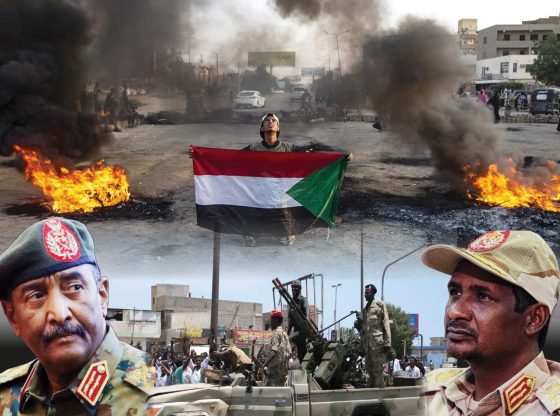Ali Saadi Abdul-Zahra – Teacher at the Faculty of Law/Al-Nahrin University
Introduction:
After the fall of Omar al-Bashir’s rule, the military became divided between two armies, the first being the regular army led by al-Burhan, the second being the Rapid Support Forces led by Hemeti, and the latter having economic strength and external support.
The two sides have entered into a power struggle, the army is trying to engineer the political process, after handing over power to civilians in its favor and integrating the RSF into the army, which it has rejected. (Hemeti), which means the end of his role in military and political terms, thus ending the military contract between the two parties and engaging in an armed conflict in which the Sudanese people were and continue to be victims, as well as for each of them. (Al-Burhan and Hemeti) Regional alliances and understandings sometimes contradict. (Hemeti) is closer to the UAE, which wants to preserve its interests in the Sudan; There is therefore undeclared support by some Arab countries for the military parties fighting for their interests without regard for the interests of the Sudanese people.
First: The Egyptian role in the Sudanese crisis:
The various political forces that succeeded in ruling in Egypt have almost gathered that Sudan is within the vital area of its national security and that it represents its southern strategic depth, which makes it constantly keen to maintain strong relations between it and the ruling regime in Sudan. Abdel Fattah El-Sisi is very interested in the relationship with the Transitional Government in Khartoum. The fight against the Muslim Brotherhood and the prosecution of its members are among its concerns regarding the Sudanese issue. However, greater attention is being paid to establishing a close relationship with the military component of the Transitional Government and including it in the framework of the Egyptian security strategy, especially given Egypt’s perceived Ethiopian threat to it; Because of the Renaissance Dam project, the military component of the Sudanese transitional government is aware of Egypt’s influence, It recognizes that its logistical or military service will make it an indispensable actor in maintaining security and stability in the region. or active participation in the fighting, so there were frequent visits between the military in Khartoum and their counterparts in Cairo and culminated in the signing of a military cooperation agreement between them on 2 March 2021, It was followed by joint exercises between the Sudanese and Egyptian military in May 2021.
With the onset of the Sudanese crisis echoing Egypt’s name, the crisis began with the rapid mobilization of support for its forces in the vicinity of Meroe, the airport where a group of Egyptian air forces attended, and participated in joint exercises. (Nile Eagles) have been stationed at the airport since April 2021, and the Egyptian presence at Meroe Airport has been heavily highlighted after opposition to the army described it as an Egyptian occupation, In violation of Sudanese sovereignty, the resistance committees in the city of Meroe demanded a statement that the Egyptian army leaves the city immediately, As the clashes began, SAF was accused of labor and treason. and as an occupying force by the Rapid Support Forces, an attempt to influence the Sudanese people s presence in Sudan. and those who posted videos on social media before the armed clashes attacked Egypt and considered it an occupying power, and announced that they stand with rapid support if the Sudanese army enlists Egyptian forces in the internal conflict.










